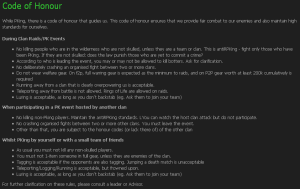ARPK
Anti-Random Player Killing (sometimes shortened to Anti-RPKing or ARPKing) is a style of RuneScape gameplay in which a player or clan chooses to engage in combat in the Wilderness only with other players who are prepared to fight. The Wilderness Guardians was founded on the principle of ARPK, and maintains an optional ARPK policy.
Contents
Definition
A "random" player is considered to be anyone who enters the Wilderness with the intention of avoiding PvP combat. Their objectives may be to PvP, train non-combat skills such as hunter or slayer, complete clue scrolls, or collect resources. An ARPK clan will not attack such players who do not wish to fight and instead focus their efforts on finding PKers, clans and teams to battle with. A reasonable way to determine whether a player is random or a PKer is by the presence or absence of a skull, which indicates that they have attacked another player.
ARPK differs from Anti-Player Killing (Anti-PKing or APK) in that APKers disagree with the concept of PKing entirely. A common misconception was that APK clans did not PK at all - this was incorrect and APK clans would engage in fights in the Wilderness but only to defend a random player under attack.
ARPK in WG
As of 2018, WG has an optional clause for ARPK in their Honour Code. The provision explains that ARPKing is not always feasible due to the lack of activity in the Wilderness and the considerably small number of PKers against which WG can compete. As a result, the ARPK policy is not in operation unless the leader of the PK trip decides to activate it. Outside of clan events (such as PKing with a team or solo), the ARPK policy does not apply to members.
History
WG was founded on the principle of Anti-PKing in 2003, after His Lordship was PKed in the Wilderness while collecting runes. The first #1 rule of WG prohibited WG members from attacking any other player without the skull status.[1] This policy remained in place through to around 2007, though there were periods during which it was disregarded, and clan members would simply attack anyone in the Wilderness unless ordered not to. Over time, WG also transitioned their belief from Anti-PKing to ARPK.
Several modifications were made to the ARPK policy over the years, and WG also offered various ARPK-related services to non-clan players. In 2006 and 2007, if a player was killed by WG member(s) while they themselves were not PKing, they were entitled to be paid for items lost as well as a compensation fee from their attackers (if evidence could be provided).[2] As well as this, WG offered protection services for players Abyss runecrafting, killing green dragons, mining runite ore, or doing clue scrolls; or for clans requiring an AC (Anti-Crash) service for wars.[3]
Controversy over the relevance of ARPKing arose after 10 December 2007, when new PvP changes rendered the Wilderness "safe". WG's Code of Honour was modified appropriately - removing the redundant "skulled" identifier and replacing it with "random" players, which were defined as "people who are in the wilderness who are CLEARLY not there for a fight, for example EP gainers".[4]
During The Reckoning in 2011, the "random" identifier was removed and WG reverted to determining fair targets by the presence of a skull. In October 2011 this was revised again, to include players with combat weapons, in a clan or team, people using botting software, and anyone who requested to be killed or attacked the clan first.[5] Protected players were anyone unskulled without a weapon, and anyone using brawling gloves (which took priority over the combat weapon rule).
Throughout 2011 the ARPK policy began to fall into disuse, partially due to the lack of activity even after the restoration of Wilderness PvP in early 2011. Due to WG's diminishing size and its inability to compete with stronger forces, it became essential to engage in fights with all players encountered in the Wilderness - not doing wo would have had serious consequences to the clan's overall health. In February 2012, His Lordship and Vio released The Wilderness - An Unauthorised Biography - a 15-minute documentary on the history of PvP clans. It was at this point, WG officially started to recognise the importance of RPKing and its role in the Wilderness's "food chain". A few days after the documentary's release, ARPKing was officially renounced for the first time in WG's history on 27 February 2012 by His Lordship.[6]
Over the next few years, numerous discussions were held regarding the reimplementation of the ARPK policy, some as early as mid-2012.[7] It would be another 5 years before the first official restoration of the ARPK policy occurred on 25 January 2017, under Mojo's leadership.[8] However, the code was not heavily enforced or adhered to, as the same issues regarding Wilderness activity still applied. Variations to the code such as allowing the leader of the event to determine whether ARPKing should be followed or not were set forward, but ultimately proved ineffective. The restored ARPK policy continued to be significantly disregarded up until March 2018, when it was officially suspended.[citation needed]
References
- ↑ The Rules and Beliefs of the Wilderness Guardians, AvidGamers. Archived from the original on 21 September 2004, retrieved 26 March 2025.
- ↑ His Lordship (6 August 2006), "Killed by a WG?" (Dead Link), Z6.
- ↑ His Lordship (4 June 2007), "How to Request Protection" (Dead Link), Z6.
- ↑ Gorgemaster (11 August 2009), "Step 1 - Rules & Requirements", IPB1. Retrieved 26 March 2025.
- ↑ Vio (13 October 2011), "Updated Code of Honour", SMF. Retrieved 26 March 2025.
- ↑ His Lordship (27 February 2012), "Much To Announce", SMF. Retrieved 26 March 2025.
- ↑ Vio (18 June 2012), "ARPKing?", SMF. Retrieved 26 March 2025.
- ↑ Mojo (25 January 2017), "ARPK, Trial Warlord, Maces, Bank Tags", SMF. Retrieved 26 March 2025.
